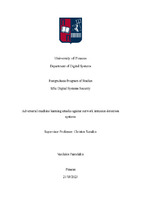| dc.contributor.advisor | Ξενάκης, Χρήστος | |
| dc.contributor.advisor | Xenakis, Christos | |
| dc.contributor.author | Παντελάκης, Βασίλειος | |
| dc.contributor.author | Pantelakis, Vasileios | |
| dc.date.accessioned | 2023-04-07T08:49:24Z | |
| dc.date.available | 2023-04-07T08:49:24Z | |
| dc.date.issued | 2023-03-21 | |
| dc.identifier.uri | https://dione.lib.unipi.gr/xmlui/handle/unipi/15335 | |
| dc.identifier.uri | http://dx.doi.org/10.26267/unipi_dione/2757 | |
| dc.format.extent | 84 | el |
| dc.language.iso | en | el |
| dc.publisher | Πανεπιστήμιο Πειραιώς | el |
| dc.rights | Αναφορά Δημιουργού-Μη Εμπορική Χρήση-Όχι Παράγωγα Έργα 3.0 Ελλάδα | * |
| dc.rights.uri | http://creativecommons.org/licenses/by-nc-nd/3.0/gr/ | * |
| dc.title | Adversarial machine learning attacks against network intrusion detection systems | el |
| dc.type | Master Thesis | el |
| dc.contributor.department | Σχολή Τεχνολογιών Πληροφορικής και Επικοινωνιών. Τμήμα Ψηφιακών Συστημάτων | el |
| dc.description.abstractEN | Machine learning techniques have become increasingly popular in intrusion detection systems (IDS) due to their ability to automatically learn patterns and behaviors of normal and anomalous network activities. IDS aim to detect and prevent cyberattacks that can potentially cause significant damage to computer systems, networks, and sensitive information. Traditional intrusion detection methods rely on manually designed signatures and rules to identify known attacks, but they often fail to detect novel and sophisticated attacks. Machine learning-based IDS can automatically learn from large volumes of network traffic data and detect anomalies that may indicate an intrusion attempt.
The thesis focuses on the application of machine learning algorithms in developing an IoT intrusion detection system. The study explores various types of machine learning algorithms, including supervised and unsupervised learning, deep learning, and ensemble learning, and discusses how they can be used to detect anomalous activities in IoT networks. The study aims to enhance the accuracy and effectiveness of intrusion detection systems by exploring the robustness of deep learning model to adversarial attacks. The research implements three types of adversarial attacks: Jacobian Saliency Map attack (JSMA), Fast Gradient Sign Method (FGSM), and DeepFool, to evaluate the robustness of the deep learning-based intrusion detection system. The results of the study demonstrate that the deep learning model can effectively detect intrusion attacks in IoT networks with high accuracy although, it highlights the vulnerability of deep learning models to adversarial attacks and the need for developing robust and resilient intrusion detection systems. | el |
| dc.contributor.master | Ασφάλεια Ψηφιακών Συστημάτων | el |
| dc.subject.keyword | Machine learning | el |
| dc.subject.keyword | Adversarial attacks | el |
| dc.subject.keyword | Network intrusion detection systems | el |
| dc.date.defense | 2023-03-27 | |



